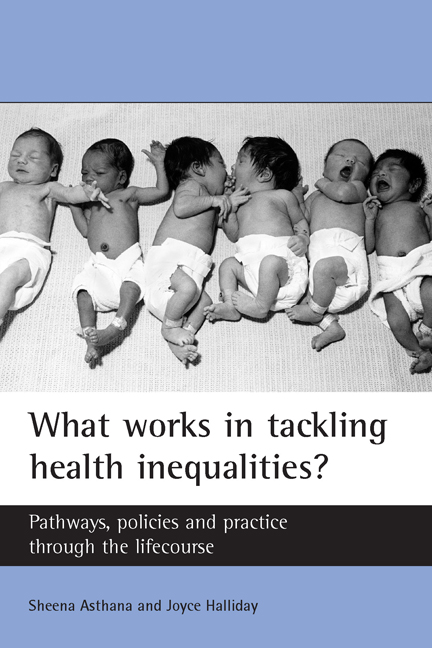Book contents
- Frontmatter
- Dedication
- Contents
- List of tables, boxes and figure
- Acknowledgements
- List of abbreviations
- one Introduction
- Part 1 The research and policy context of health inequalities
- Part 2 Health inequalities pathways, policies and practice through the lifecourse
- Part 3 Tackling health inequalities: developing an evidence base for public health
- Index
thirteen - Older age: policy and practice
Published online by Cambridge University Press: 14 January 2022
- Frontmatter
- Dedication
- Contents
- List of tables, boxes and figure
- Acknowledgements
- List of abbreviations
- one Introduction
- Part 1 The research and policy context of health inequalities
- Part 2 Health inequalities pathways, policies and practice through the lifecourse
- Part 3 Tackling health inequalities: developing an evidence base for public health
- Index
Summary
Introduction
There is no consensus as to when old age starts or whether it should be defined by chronological age or frailty. Indeed, as policy initiatives such as Better Government for Older People (BGOP) include all those aged over 50, old age may embrace three generations. There is, however, an undisputed increase in the number of very elderly people and a growth in elderly-only households. These demographic and social trends have combined with factors such as the changing context of informal care and the cost of acute care to focus attention on the health and social care needs of older people, an area where research has traditionally been both undervalued and underfunded (Bowling and Ebrahim, 2001, p 223). The Independent Inquiry into Inequalities in Health (Acheson, 1998) also reinforced the message that older people have particular health needs.
The National Service Framework for Older People was published in March 2001 and was supported by an additional £1.4 billion for the development of health and social services (to 2004), with an extra £1 billion set aside for communitybased services by 2006. Its aim was to promote the independence and wellbeing of older people, including the support for them to live at home or in community settings as far as possible. Towards this end it sets eight standards for improving health and social care across the spectrum, including access to Intermediate Care services at home or in designated care settings, a specialist falls service, integrated mental health services and, significantly from a preventative point of view, the promotion of health and well-being (DH, 2001a).
These standards are underpinned by four, now largely familiar, principles. The first is a partnership approach between the National Health Service (NHS), local government, the independent sector and older people themselves/their carers with the aim of producing integrated assessment, commissioning and service provision. The second focuses on a timely response to needs, including aspects such as information sharing and teams working across primary care, acute services and community. The third is the adoption of person-centred care regardless of age (including the devolution of budgets to front-line practitioners and service users and a diversity of service provision), while the fourth is the promotion of health and an active life.
- Type
- Chapter
- Information
- What Works in Tackling Health Inequalities?Pathways, Policies and Practice through the Lifecourse, pp. 507 - 560Publisher: Bristol University PressPrint publication year: 2006



